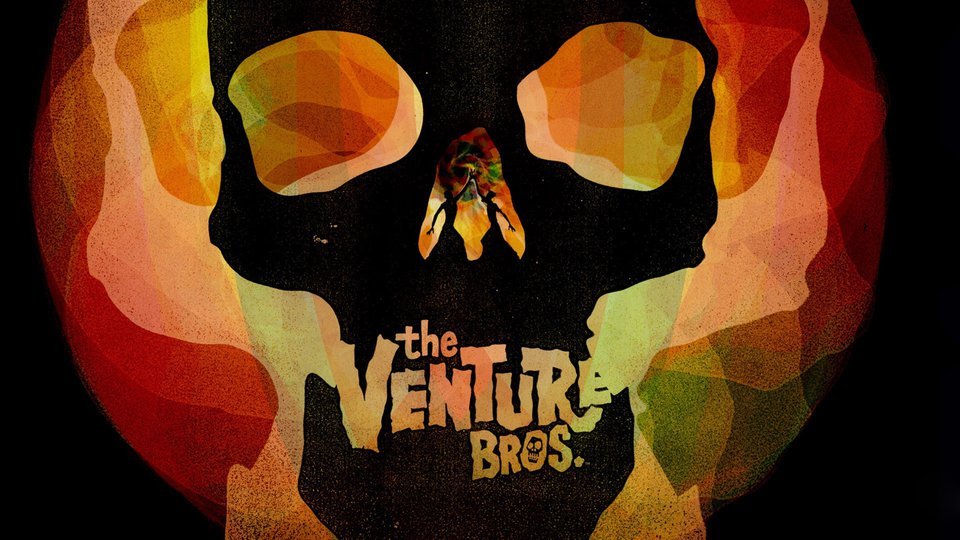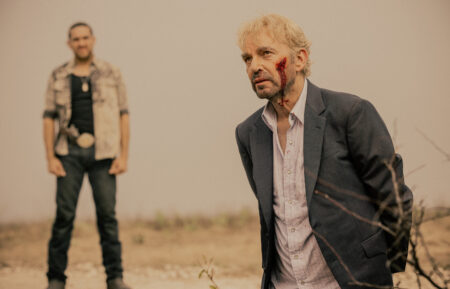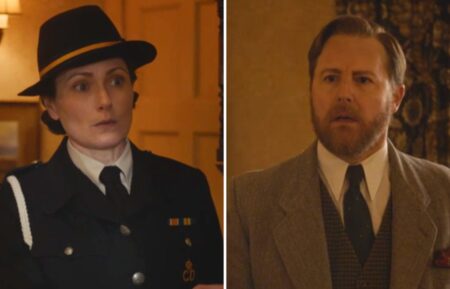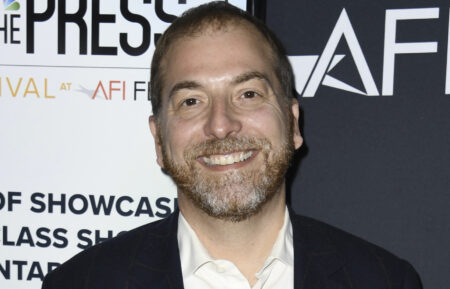‘The Venture Bros.’: Get Gargantuan Scoop About Everything in Season 6, Including the Finale (VIDEO)
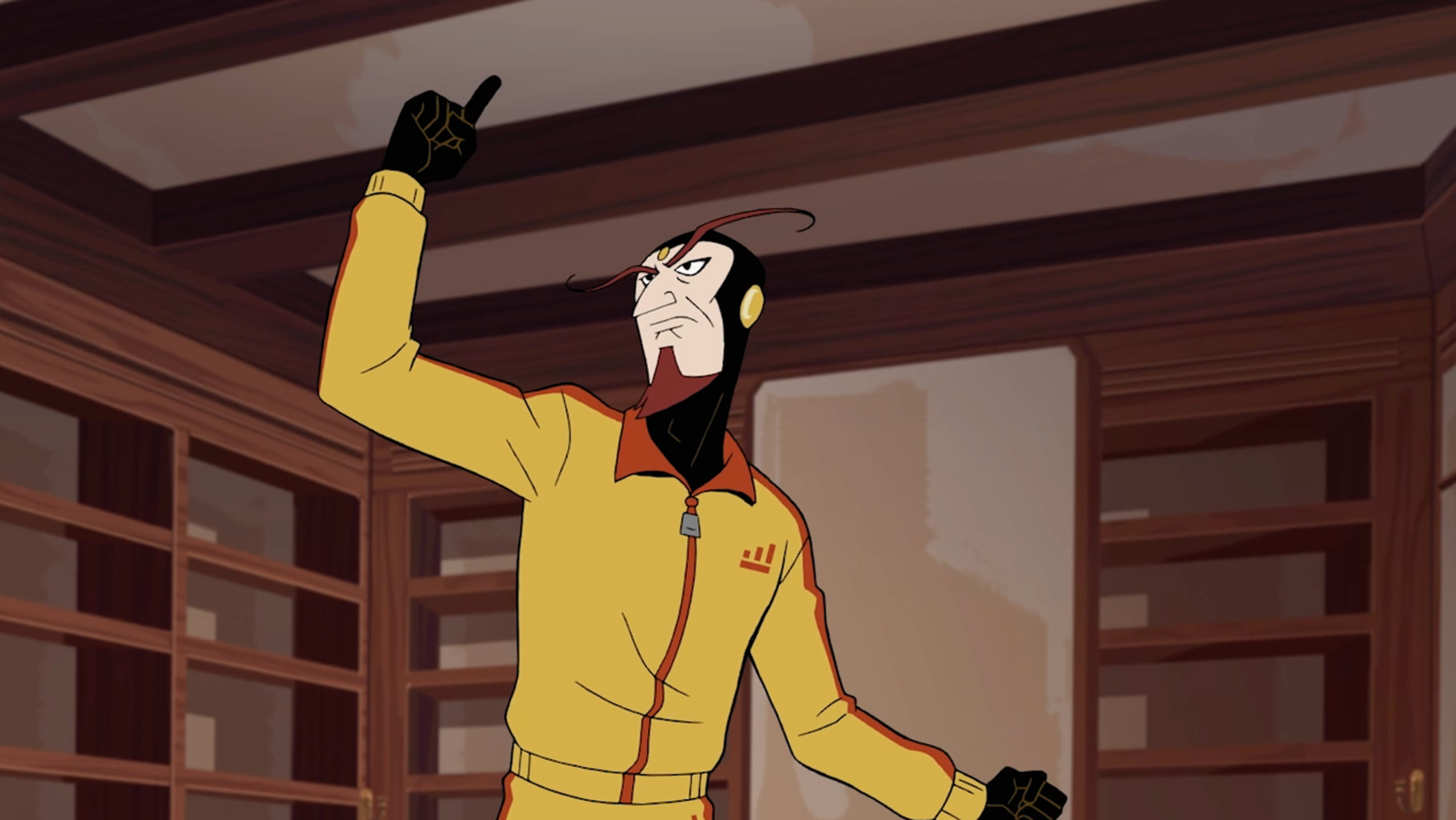
The Ventures are living it up in New York as “level 10 protagonists” while their former arch nemesis, The Monarch, dons the guise of the Blue Morpho vigilante in New Jersey. In the wake of 2015’s “All This and Gargantua-2” special, Season 6 of The Venture Bros., Adult Swim’s long-running Jonny Quest-style boy adventurer spoof, made some major changes to the show’s formula. Co-creators Jackson Publick and Doc Hammer have spent 13 years refining the show, but now the first set of episodes to use the New York setting, the newly restructured Guild of Calamitous Intent and the Ventures’ new primary arch villain, Wide Wale, is coming to an end.
In discussing The Venture Bros. a reference to a nuanced system of law enforcement regulations is just as likely as a reference to a (seemingly) one-off joke about a dugong-themed super scientist. While talking to Publick and Hammer, we managed to cover both topics, along with details on what to expect from the final episodes of Season 6. Read on for a full briefing from the co-creators on The Monarch’s expanded role and The Guild’s new layers of red tape, and then watch an exclusive clip (warning: NSFW) from this week’s episode.
About: The Monarch and Blue Morpho | The Bureaucracy of Arch Villainy | The Season 6 Finale
The Monarch and Blue Morpho
We’ve seen a lot more of The Monarch in Season 6. How did that come about?
Jackson Publick: We dug ourselves a hole this season with a pretty specific arc to The Monarch’s story that compelled us to put him in every single episode, so that story had to get told in order. Sometimes you finish a season and they don’t all interconnect. If you feel that one’s a little stronger, you run it earlier or later depending on what you want the momentum to feel like, or you know, if it’s sweeps week or some crap like that.
Is it a problem that The Monarch is in every episode? Did you not consider him to be a main character when you started out?
Publick: I think people like him, and I guess he’s graduated to a main character. I definitely didn’t know he’d even be recurring when we first started. He was in the pilot, and I had more of an idea of a villain of the week kind of thing. There would just be so many people trying to kill Dr. Venture at all times. And you know, when we started getting into writing some of the stories, we would just come up with a placeholder villain, and go, “Okay, well, this guy is bugging Dr. Venture like this,” and then we would go, “Oh, f–k it, we might as well just make it The Monarch. We know what his voice sounds like.” And we just kept doing that. But even then, we tried to keep him in only half the episodes at most. But, like everybody else’s story on the show, his got really involved, and he comes with his own mini-cast, between him and his wife and 21 stepping up from henchman obscurity. They’ve earned their place as co-main characters with the Venture family.
Especially this season with the Blue Morpho storyline.
Publick: Yeah. He hijacked a good portion of the season. It was a lot of fun to write for, and we knew what we were doing when we did it. It’s not like we just fell into it and were like, “Oh crap, we’ve got to put The Monarch in this one.” It did make it tricky. We balance it so there are episodes where it’s just the B or C plot, and it’s tangentially related to the main story. There are others where he’s the majority of the episode, like [the March 13 episode] where he has a pretty big role. But if you’re telling a Venture story, you have to save about a third of your script for The Monarch. We definitely had to write around it a little bit and pare down some of the other stories.
What made you want to do an extended Green Hornet reference with The Monarch?
Publick: Because we thought it would be funny. We had moved him back into his childhood home, and we knew we were going to do this when we were writing Season 5. We were dropping little Easter eggs in Season 5 because, when we started that season, we had already talked about where we were going to take the show in Season 6. We knew we were doing the New York thing for the Ventures. There were a couple of episodes where it’s touched on a little, like you see The Monarch’s parents in an old photograph that gets passed around a couple of times. And in one of the flashback episodes, the Spanakopita one, his parents were on the boat. We kind of knew we were going to deal with this, and that it would be fun for The Monarch to take on another guise to get around his problem of not being able to arch Venture because there’re so many people ahead of him. It just seemed like a fun way to have some shenanigans.
Did the arc with The Monarch as Blue Morpho take up more of the season than you intended, and will it be resolved this season?
Publick: It was always going to run the whole season, but that is the arc that we have to finish, so no, that won’t be fully resolved. Every episode the stakes get raised, and it comes to a certain amount of head. But that is going to be resolved in…the next season [Laughs].
Continuity Changes and The Bureaucracy of Villainy
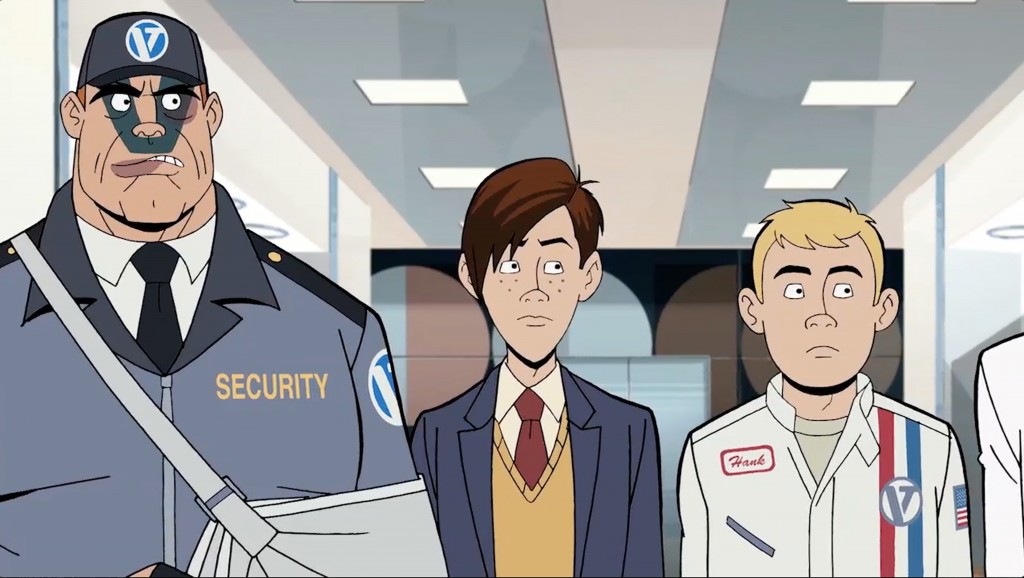
OSI agent turned arch villain turned bodyguard turned security guard Hatred with the Venture brothers, Dean and Hank
You were planning Blue Morpho since Season 5. Generally speaking, how far out do you plan out storylines?
Publick: It’s almost never as preconceived as what we’re doing this season. There’s some stuff that we’re thinking about, and we don’t know when we’ll ever get there, but a lot of times if I create a character or a subplot, I’ll have way more to say than is going to fit in one episode, or I’ll know that I want to take it some place in the future and I’ll drop some breadcrumbs toward that. So sometimes, you know you’re going to do it, and you tease little things, and you’re like, “Alright, well, someday I’ll crack that story and I’ll figure it out, and we’ll work it into this.” You may not have the full story in your head, but you’re like, “Oh, I really want to see The Monarch go to this place eventually.” I start laying the groundwork. But if we never get there, then this episode I started will just seem like a fun and interesting little thing that happened; if I do get there, it’s always waiting for me. And it also works the other way, where we retcon things later on because the light bulb goes off, and you start thinking about your own continuity. You go, “I want to do this idea, how can I justify it with what’s gone before?” or, “How can I make sure I don’t accidentally trip over something we said in the past that locks me into this being impossible?”
The plot points that feel like they presented themselves by chance are some of the funniest references. Wide Wale being related to Dr. Dugong for instance.
Publick: Yeah, I guess that’s out in the open. That’s the kind of thing we thought only really sharp, totally-up-on-all-their-continuity viewers would get, but like everybody knows [Laughs]. That was something we thought we would have to reveal more overtly later. Although, I did have to cut a scene for length from the first episode where I made that a little more explicit—Wide Wale was looking at a picture of his brother. My script was too long, and that was just one of those places where we were like, “Hey, we don’t need to front load this with all the information right now.” We’ll pick it up in a line of dialogue in another episode, and then we’ll hit it a little harder a couple episodes after that. But yeah, he’s got a bone to pick with The Monarch that goes back a long way.
[Doc Hammer joins the conversation]
New info is constantly being added to the histories of established characters. Are there any plot lines or backstories that are set in stone?
Doc Hammer: Sadly, everything is. Some of our histories are set in stone and we won’t change them. We were just dealing with that yesterday. We throw out a date that, at the time, seems arbitrary, and then later, we have to deal with that number. We’ve become a little smarter with not throwing out as many numbers.
Publick: There are two ideas that have come up over the course of us discussing new stories that are, unfortunately, a little hamstrung by us committing to a date, when somebody just talked about it in an episode four seasons ago. You go, “Aw, damn it. This character said this year, so this awesome story idea can’t have happened 5 years later; it could only have happened before that event.” That’s about it, though. Everything else, we’re constantly undermining what people think they know about the truth. And we always have the ability to say, “Oh, well, when such and such character said that, he was lying,” or “he was misinformed.” [Laughs] Like St. Cloud!
Hammer: Oh yeah, St. Cloud is just talking out of his ass. I mean, we all have Google, we can check that information out. It’s not like it’s difficult for us to do it. St. Cloud is just spouting garbage.
Publick: [Laughs] Yeah, all our characters are unreliable narrators, potentially.
Hammer: I think we established that in the first season.
Publick: I mean, look at Rusty. He thought Spanakopita was a real holiday, and a real thing that happened to him as a child. And we only just learned that! These characters, you know, if there’s 10 episodes, you’re seeing them 10 days out of the year. They have full lives and other adventures going on between the episodes.
This show has only been going on for six seasons, but it feels like so much longer because of the depth of the backstories. How many years has it spanned for the characters?
Hammer: For myself, I never could figure out how long that span of time is, in the show’s logic. I’ve never been able to figure it out.
Publick: And that’s an issue brought about by the fact that we’ve been making it for 13 years, but in the continuity of the show, maybe only a few years have gone by.
Hammer: Yeah, it’s probably only like three or four years.
Publick: That’s why we can’t really say dates anymore. We can’t pretend that Season 1 took place in 2004.
Hammer: Yeah, I was working on a script last night, and for a flashback, I wrote “a season ago,” instead of, you know, “last month.” [Laughs] That’s how I have to think about it. It’s something that happened a season ago.
Publick: What do The Simpsons do? They just change stuff. Like every five years, they just change everybody’s history. Like Marge and Homer met a totally different way than they met when they did a flashback in Season 2 or whatever.
On a side note, what’s been going on at Spider Skull Island since J.J. left?
Publick: Didn’t we say at the funeral that Sally got Spider Skull Island? So I’m sure Sally’s got a full life. It may not be totally happy right now, but we haven’t been interested in that story.
Hammer: And she has to take care of Ned, and she has another family member who’s on fire all the time. It’s hard for her. She needs that island. More than I’m surprised that we didn’t talk about what Sally’s up to, I’m surprised that we did talk about what the pirate’s up to.
Publick: He kicked the tranq habit. He’s like a CFO or something of the company. He does work at the company.
Hammer: When you want someone to run a company, a pirate is basically what you hire. This one just happens to wear the outfit. But I think most of them are pirates anyway.
[jwplatform 2TakAN1o]
This show has so many levels of bureaucracy. The March 13 episode goes into detail on the Equally Matched Aggression level system for The Guild. What originally gave you the idea to take something like costumed arch villainy and turn it into a regulated government job?
Hammer: What gave us the idea for The Guild? We invented them when we were doing the yard sale episode, because we had to justify having villains and their arches on the same property. It’s just fascinating that these people, throughout comic book history, can keep fighting each other, but they just don’t off each other. There just has to be something going on behind the scenes so they just don’t show up to their bedrooms and kill them with a baseball bat in their sleep. Everything has to be this big pomp and circumstance, show-up-with-a-giant-robot nonsense so there’s not just full-on slaughter.
Publick: Yeah, and you can’t just show up with a giant robot against a guy who’s a meek scientist who just has a six-person startup.
Hammer: Unless he has a giant robot. That’s your Equally Matched Aggression right there. I’m not that surprised that we came up with it. I’m more surprised that somebody else didn’t come up with it before we did. It seems like a fascinating thing, the bureaucracy of fighting each other eternally.
Publick: Sure. And you have to wonder how even in these organizations, in like James Bond and stuff, there has to be a bureaucracy because they have to function. They have numbers and ranks, and people need to figure out what to put on their tax forms and everything else.
Hammer: Somebody’s got to design all those matching costumes and there has to be HR somewhere, or you’d have a problem.
Publick: As we see it, it basically started as a union, in a way; a union that has to make a tacit agreement with the powers that be because everybody’s interested in a certain status quo, not-doing-too-much-damage kind of situation. You’ll never be able to stop crime, you just need to be able to control it. The way the FBI might have a handshake agreement with the mafia.
Except with The Guild and the OSI, it’s all in writing.
Hammer: [Laughs] We can get away with having them write all this down.
The ‘Final Episode of the Season’ and The Venture Bros. Future
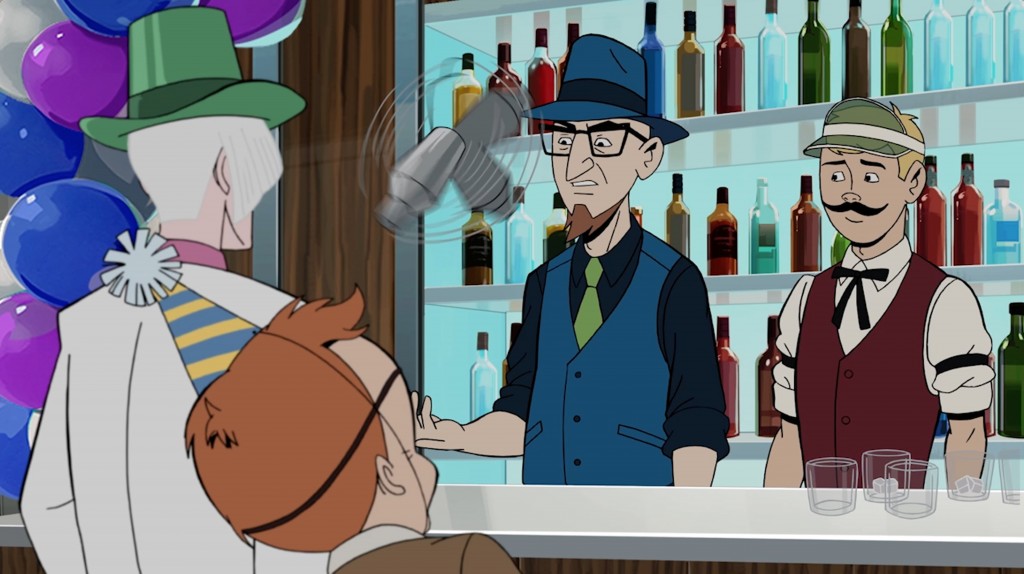
Dr. Venture gets his hands on Blue Morpho’s suit in the penultimate episode of the season.
What can viewers expect going into the last two episodes of Season 6?
Publick: We’re especially proud of this [second to last episode of the season]. It actually should have been the season finale. We actually tried at the last minute to retcon that and the one that follows it to make it into the season finale because it felt just a little more epic and pretty and compelling than some of the other ones, but there were continuity issues we couldn’t get around.
Can we expect a big Venture Bros. style cliffhanger at the end of the season finale?
Publick: Absolutely not. It will be very disappointing as a finale. [Laughs] The same thing happened to us last season, actually. We didn’t have a big finish last season, because we shot ourselves in the foot. We basically ran out of episodes to get to the point of the story that we wanted to do a blowout ending for. So that’s why you ended up with the Gargantua special, the space special last season. That story would have been the hour-long or two-part finale of Season 5, but we hit our 10-episode mark before we got to it. So we did a special that bridged the two seasons. And the same thing is happening at this point.
The story we’re writing now would have been the season finale, but we didn’t get to it. We weren’t ready for it when it came time to write the last two scripts. And there was actually a little confusion for a while as to whether or not the Gargantua special counted against our 10-episode order, so we were writing like four different stories at the same time not knowing whether we had two scripts left or four. When it turned out we only had two, we were like, “Alright, I guess we should do our finale.” And then we thought, “No, we haven’t really earned it yet. We need to flesh out this Monarch arc a little more….” So we made a judgement call and wrote two other stories that we were very excited about.
What excited you about the ideas you ended up using for these last two episodes?
Publick: We hadn’t quite cracked the complex finale story yet, but we had a lot of sudden inspiration for two scripts that eventually became the [March 13] episode and the one that’s going to be on the next week. We wrote these stories to fit in between some of the stories that had already been written, because we just felt like we didn’t hit a couple of plot points enough. We had two big ideas that were fun and not pre-planned. They were just inspirations that hit us, and sometimes when you’re in the throes of production and you’re just doing a million things at once and you’re exhausted and you’re behind schedule and everything, you grab the one that is exciting that you want to start writing right now, as opposed to going, “No, we have to write this other one.”
Do you intend the story you’re writing now to be another between-seasons special, or would it be the premiere of the next season?
Publick: At the moment, it would be the premiere for the next season. But you never know with us. Just like the Gargantua special, once we actually produced it, we went, “Hey, it would be much better to just put this on TV now than wait until the rest of the season is done.” It lent itself to being a special. This story we’re telling right now is not a special. Right, Doc?
Hammer: Yeah, the Gargantua one had such an epic scope, and it wasn’t happening on the Venture Compound. It kind of worked as a special. But this is just the last part of the story. Although we were tinkering with putting it at a certain time that would make it a special. But uh….
Publick: [Laughs] Yeah, we recently abandoned the idea that it would be a Thanksgiving special.
Hammer: But that was more driven by how hot we were to include the Macy’s parade in New York.
So the Ventures are going to stay in New York? They’re not going back to the compound or anything like that after Season 6?
Publick: The Compound’s gone, and they live in New York now.
Hammer: I’m writing for the Compound as of this minute, actually.
Publick: Are you writing a flashback?
Hammer: Yeah, the whole flashback, and somebody is prowling around the area. So the physical space still exists.
Anything else you want people to know about the finale or plans for the future?
Hammer: We want them never to use the word finale. The “final episode of the season” would be better to use. And it’s not like it’s a letdown or anything, it’s just that we didn’t get to finish our thought.
Publick: Right, don’t think of it as a finale so much as a year plus pause in your viewing pleasure. [Laughs]
Hammer: And if you’re anything like me, you’ll watch all this crap in one go anyway. The people who watch it all in a mad, drunk Hulu binge for two days are never going to know anything happened, but for the people that diligently watch cable…[sighs]. Like life, sometimes things just don’t wrap up neatly at the end of X amount of episodes. This is post-justification. This is retcon right here.
Publick: We would have made more if we could, and we would have planned more carefully if we could have [Laughs]. But, you know, had we done the finale, there’s two episodes from this season they never would have gotten, and I think they’re two of the strongest ones.
Hammer: Yeah, I like this season, regardless of how it begins or ends. We just didn’t have enough episodes to really wrap it up the way we wanted. But I’d rather have it dangle there than have it be poorly wrapped up.
The Venture Bros., Season finale, Sunday, March 20, midnight/11c, Cartoon Network

